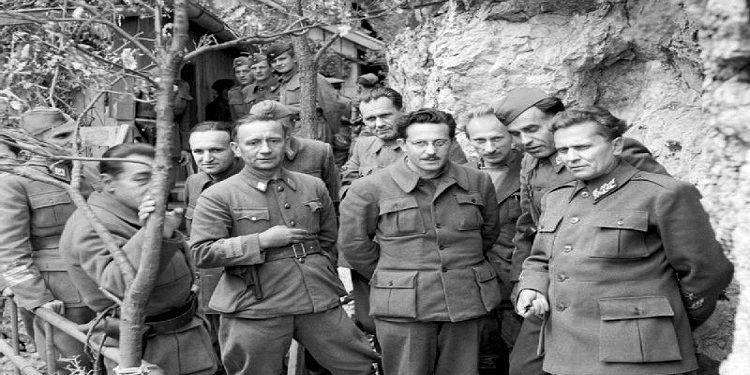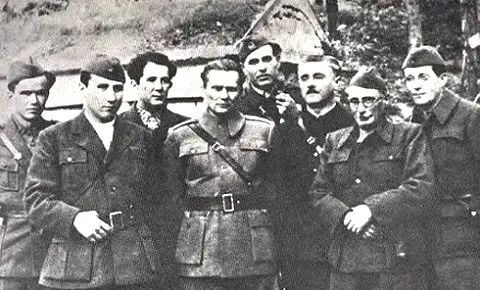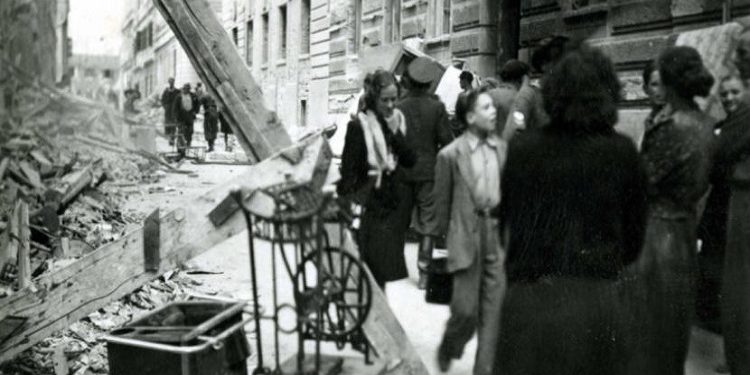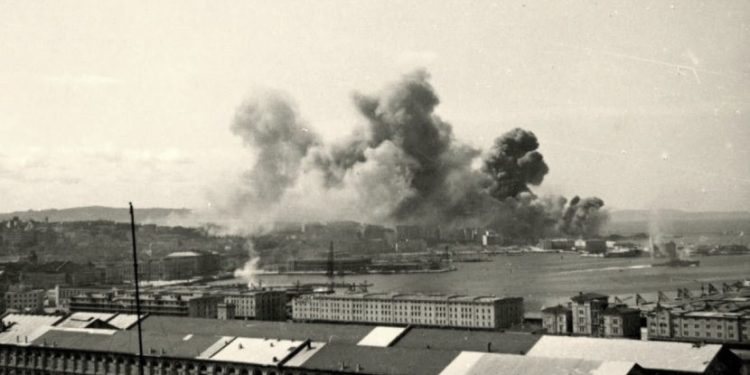By SHPENDI TOPOLLAJ
– SHOCKING STORIES IN THE BOOK “MAGAZINA 18”, BY SIMONE CRISTICCHI AND JAN BERNAS –
Memorie.al / Regimes with extreme ideologies always make life terribly difficult for their citizens. But no less are the experiences of those who historical fate threw between the two jackals; the fascist and communist regimes, as described in the book “Magazina 18”, which gives us shocking testimonies of Italians exiled from Istria, Fiume and Dalmatia. From the brilliant mind of the philosopher Friedrich Nietzsche, the words have come out that; “Living is suffering, surviving is finding a meaning for suffering”. This is also the aim of the author Simone Cristicchi, the winner of the Sanremo festival, with the song; “I Will Give You a Rose”, with journalist Jan Bernas, as they try to reflect from the survivors, in the form of non-chronological narratives and diaries, what happened to that population that, although in their own lands, remained an apple of contention between Italy, since Mussolini and Tito’s Yugoslavia.
Their entire tragedy is played out under the direction of the Great Powers and then, under their indifference to the painful consequences that the decisions taken brought. The claims of the parties were resolved by favoring the Slavs who were called winners, at the expense of those who, although they were ordinary people, were branded as losers, forgetting that the winners were even more savage, since it is exactly as Ronald Reagan said, that; “Communism can only function in two places, in heaven, where they don’t need it, and in hell, where they already have it”.
And to see this hell, it is enough to enter “Warehouse 18”, a ghastly number of blood, according to Neapolitan letters. Because when you enter there, there is no way that those old shelves, thrown in disarray for a long time and gnawed by rats and moths, but which, even as they are, speak the language of what happened, cannot help but evoke so many bitter memories.
Those families and those people, many of whose homes were divided in two; since half belonged to Italy and the other to Yugoslavia, were also left divided themselves, since they did not know where to turn, especially in the confusion that followed the collapse of the Titoist communists with Stalin, where the people of this country themselves were divided in two.
And from that place where the sword of revenge and class struggle fell upon its own people, one could not expect just, noble and humane behavior towards the Italians who remained. Goli Otoku with its horrors that did not spare the citizens of the Federation of Yugoslavia, nor did it consider the “collaborators” of fascism, as the innocent Italian citizens were called, anyway politically perverted or not at all interested in it.
At that time of hysteria and the alleged revolutionary enthusiasm of the young proletarian class, who according to the testimony of the young girl, Marie, “There were people who came from the forest, unwashed and poorly dressed and who in the building of the Italian Bank, raised chickens and cultivated parsley in the bathtub. They didn’t know what a toilet, a bathtub, or a bidet was”, it was no wonder why, based on the instinct of the criminal, they not only discriminated or expelled them, but also threw men and women into abysses.
The prisoners were destroyed for no reason not only physically, turning them into Mauthausen skeletons, but also morally, to the point of forcing them not to declare themselves dead, for a spoonful of soup broth, or to mistreat, denounce and even lynch each other between two rows. Mrs. Nella Osso still remembers with horror: “We were scared. From time to time the old partisans would tell us: ‘There are still free places, in the Karst dungeons'”.
The book contains numerous cases of Slavic atrocities, which are not unknown to us Albanians historically, but here it is not forgotten that the Black Shirts also behaved with the same meanness, who, in accordance with the Duce’s orientation that; “we will follow the policy of a strong hand, without tolerating anyone”, set fire to the Hotel “Balkan” in Trieste, which they considered the heart of the cultural center, which brought about the first rupture between the two countries, that of Venezia – Giulia.
A witness to those events claims that the Slavs, after arresting and putting seven members of the family on a truck, where the night swallowed them, tied her up with barbed wire and after dragging her around, while shouting; “death – death”! They also brought her to trial, which was held by the so-called people’s judges, her father’s former farmers. For them, she was a doubly “enemy”; both as an Italian and as a rich woman. They sentenced her to death, but surprisingly, they commuted her sentence to imprisonment in medieval dungeons.
In this book, the conclusion is reached that; “Yugoslavia, on the Istrian peninsula (which ironically in the Etruscan language means dancer), brought out the wildest and most murderous nationalism that could ever be thought of”. And then the surprise continues; even when some of them returned to Italy, the unions, with communist influence, welcomed them with the cries; “Fascists, get out of here”! “You are all criminals”! And this attitude followed them for a long time, both on the street and at school, or in any ordinary job that could be given to them. But there were also many of those who, since they came from Yugoslavia, were called communists, while in Yugoslavia, fascists?!
And when those who fled from the Dalmatian, Fiume and Istrian lands, in the years 1943 – 1954, went knocking on their homes, greeted them with contempt and drove them away, saying; “What do you want here?” From lack of money, the mothers turned into beggars, because even in those miserable camps, where they had gathered, the director sold the food brought to the refugees, not forgetting that some women who passed by first, scared the children: “The refugees will eat you”. And to whom did they do this?! It is painful to say; to that woman who had also taken onions with her, to plant lilies in her place.
I am not going to go further; I am just quoting the message of this book “The universal acceptance of the truth, even if inconvenient, is the only way to separate good ideals from reprehensible actions. To commemorate an event, the truth must first be known. And the latter is known, by listening also with the heart, not just with the ears”. Those massacres do not have a political color; they are simply stained with blood. And this message applies to all the refugees of the world, which is repeated as a refrain in the accompanying poems of the book: “It is the 11th Commandment / ‘Don’t forget.’ Make your own comparisons with us! Memorie.al















